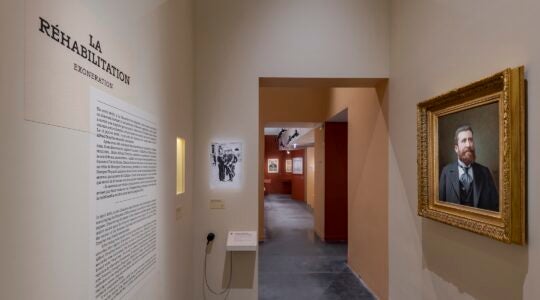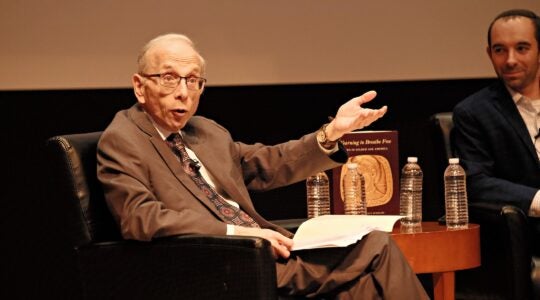Paul Golin wrote a punchy essay in these pages attacking an event at which I was a participant (“In-Marriage Advocates Are Living In The Past,” Opinion, Jan. 31). He described the woozy sense of deja-"Jew" he felt while reading that the usual suspects, those old, Brooklyn-born, “long-timers” who had been at it “for decades” were at it again. Golin suggested these out-of-touch communal leaders were standing at the “helm of a ship that they’ve scraped against the iceberg of American society,” while blaming the passengers for getting off.
As a 34-year old Hillel rabbi at New York University, originally from Ann Arbor, Michigan, I reject his mischaracterization of the diverse participants of this event as nostalgic elders trying to recreate the 1950s Brooklyn of their youth. At the conference I sat next to another young parent in her early 30s like myself and across from a young father three years my senior. Golin’s snarky words are beneath the dignity of civil discourse we should strive to maintain in the Jewish community.
More than his tone, though, I am disturbed by his steadfast evasion of the facts. There is a mountain of evidence gathered over the last 30 years showing that young people raised with two Jewish parents rather than one have higher rates of Jewish literacy; are more likely to participate in communal organizations; perform Jewish rituals and partake of Jewish cultural offerings. Two Jewish parents makes for a stronger, more culturally vibrant community. By contrast, those with one Jewish parent tend to produce children and grandchildren who overwhelmingly do not consider themselves Jewish at all and therefore do not participate in Jewish life. We could hope or pretend that this is not true, but we do so at our peril.
This willed blindness reminds me of the policy debate about the lack of two-parent homes in the United States. There, too, we find great evidence that having two parents at home instead of one produces stronger social outcomes for children. It helps in educational attainment, income level, even psychological wellbeing. It is therefore in our society’s interest to encourage families of two parents and we ought to devise policies that support this end. Similarly, having two Jewish parents demonstrably produces stronger Jewish outcomes. Therefore, if we care about the long-term health and vitality of the Jewish community we should encourage in-marriage and we should devise policies that support this. To be clear: This isn’t about chastising single moms or one-Jewish-parent families. It’s just about evidence-based social policy aimed at producing the most reliable outcomes.
Golin seems to interpret a policy favoring two-Jewish parents as social norm as a kind of scolding. This is simply false. I work with young people every day. I have hundreds of one-on-one meetings every year with college students. Many of them ask me about intermarriage. Does Golin really think I harangue and scold my students to marry Jewish?
Instead, when I get asked whether they should marry a Jew or not, the conversation sounds something like this: “You need to marry someone you love, with whom you can build a life and family with, whoever that is. It’s not my place to say whom you marry. But my guess is that you are going to marry someone you know, who shares your values. If you smoke, you’re not going to marry a non-smoker. If you’re really into working out, you won’t marry a couch potato. It doesn’t mean that you can’t keep your values if your partner doesn’t share them; it’s just not as likely. If you’re interested in a Jewish home with children and grandchildren who see themselves as Jewish, then that should shape your dating and marriage choices.” This kind of conversation invites the young person to take responsibility for the kind of family he or she seeks to raise, while factoring in the evidence we know about intermarriage.
I am also troubled by Golin’s metaphor of a sinking ship to describe the public conversation about intermarriage. I would suggest another, more timely comparison—that of global climate change. I remember celebrating Earth Day in 1990 and being told that the climate of our planet was changing irrevocably because of human action. Like so many others, I shrugged. But study after study confirms this finding. And yet so many continue to shrug anyway. Recently, however, those voices who say “there is not a scientific consensus on the data” or “maybe the earth just goes through climate change cycles and we’re in one now” seem more and more like fringe opinions who are impeding the work that needs to be done. We can bury our heads in the sand only so long.
As a society, we are now experiencing an emerging consensus that climate change is happening; that it will be catastrophic; but that we still have some time to make it better, not worse. If someone were to use the arguments of Paul Golin and his colleagues in the climate change debate, it would sound ridiculous. Could you imagine someone suggesting "The earth is still going to be here after sea levels rise, it just wont be the earth you grew up with in 1950’s Brooklyn. There might be fewer costal cities you recognize, like New York, but you’re just nostalgic for New York. You should embrace the new climate because it’s inevitable. Moreover, you scientists have been saying for 30 years the climate is changing and all your efforts until now haven’t stopped human driven climate change. You’re failing, just step aside."
I reject this line of thinking. I still think we need to make every effort to lessen the effects of climate change, just as I think that we as a Jewish community need to create social policies to promote two-Jewish-parent families. To not take this seriously is to deny reality and ensure a future none of us want. Sometimes, the message takes a generation to sink in. Like Golin, I remember hearing about intermarriage 25 years ago and shrugging then, too. Now as a rabbi working with young people, I take it every bit as seriously as I do climate change. I am not some old-timer with a tired same old message, but a young, activist committed to changing the future, not capitulating.
Rabbi Daniel Smokler is director of education and engagement at the NYU Bronfman Center.
The New York Jewish Week brings you the stories behind the headlines, keeping you connected to Jewish life in New York. Help sustain the reporting you trust by donating today.




